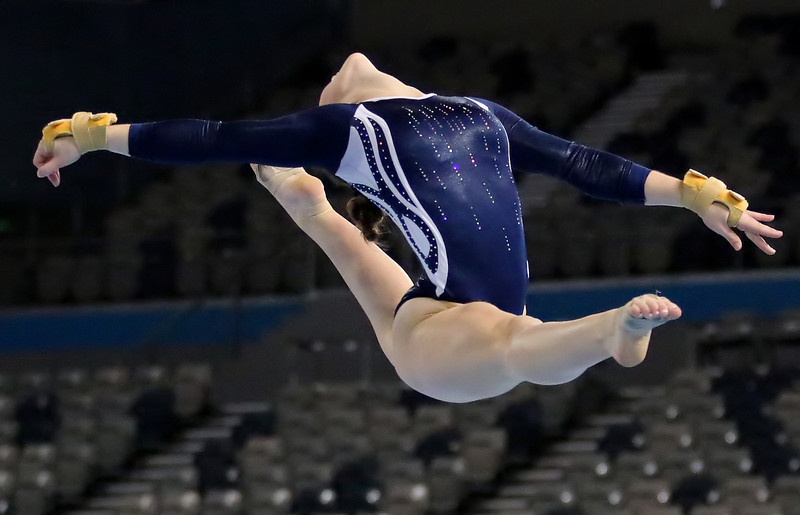On 9 April 2018, Australian gymnast Alexandra Eade was on top of the world.
At just 20 years of age, Eade became the first Australian to win a Commonwealth Games gold medal in gymnastics since 2010, victorious in the women’s floor exercise competition.
Having missed out on the chance to compete at the Rio Olympics in 2016, this was the culmination of persistence and endless hours in the gym, and a moment that she will cherish forever.
The broadcast schedule, however, meant that not many people would have seen it.
“I competed, and I finished at 6pm, and my floor routine didn’t get put up until 11pm on the television,” Eade told upstart.
“My friend’s sitting here, she said she couldn’t even watch it on TV. She couldn’t even see it.
“I had so many people back home who obviously wanted to see it but when they’re struggling to find it, it’s just such a hassle that they probably don’t even end up watching it.”
It frustrated her, but the out-of-sight, out-of-mind nature of the sport is something that she’s grown to begrudgingly accept, having lived the ups and downs of professional gymnastics.
Between the Olympics and Commonwealth Games, the sport’s two marquee events, Eade endures 32 hours of training every week, a biomedicine course, meticulous dieting, coaching junior gymnasts and a competition schedule that is predominantly out of her control due to funding issues from the governing body in Australia.
Rather than going out of her way to seek the spotlight, she simply desires some respect.
“That’s what I find frustrating,” Eade said.
“I won a gold medal, and so did so many other people, but they focus on the swimmers or the basketballers or the sprinters. They don’t focus on the other little sports along the way.
“Each gold medal didn’t get equal publicity.”
One of those little sports in question is squash.
The nature of the sport means that she isn’t a household name, but Australian Donna Urquhart has been carving a successful career on the global Squash circuit, and won gold in the mixed doubles in the Gold Coast, teaming with her cousin, Cameron Pilley.
It’s a moment she described as unbelievable, and credits a large share of the victory to Pilley’s ability to stay calm in the moment.
“He was awesome to play with,” Urquhart told upstart.
“He was always really positive and encouraging and such a good vibe to be around on the court.
“Even before we walked out on court, we always sort of remind each other just to enjoy the moment and soak it up, because it was a once in a lifetime experience to have the whole Aussie crowd there cheering for us.
“We went out there pretty relaxed because we were just thinking, ‘how good is this?!’”
Urquhart has been competing on the Professional Squash Association (PSA) world tour since 2006.
She achieved a career-high world ranking of 13th in 2011 and as of May, she is 17th.
Her gold in the mixed doubles was her third medal in Commonwealth Games competitions, adding to her two bronze medals from previous meets.
She hits the practice court twice a day, six times a week for short, sharp workouts that mimic the intensity of a match, and does extra strength and mobility training to keep in top shape.
Unlike gymnastics, squash is not an Olympic sport, and as a result, representing your country at the Commonwealth Games becomes the pinnacle.
Given it was the primary opportunity to showcase and grow her sport, Urquhart and her fellow squash players were desperate to compete.
“It’s such an important event to us as Australian squash players,” she said.
“It’s something that happens every four years and ideally you want to be ready for it because if you’re not then it’s a missed opportunity.
“You do everything you can within your control and your power to be ready once that comes around.”
There was a stage where Urquhart had to consider whether the gruelling schedule and living out of a suitcase was worth it, particularly considering the prize money available.
For context, the winner of the Ladies Wimbledon Tennis Champion ship pocketed more in two weeks than the entire female squash tour prize pool in 2016/17.
But what she hasn’t gained in prize money, she has certainly won away from the court, tying the knot with Greg Lobban, a Scottish squash player shortly after the games concluded.
She simply wouldn’t change a thing.
“I love the sport of squash,” Urquhart said.
“It’s such a great sport in so many ways and the way it challenges you.
“It would be nice to be able to, at the end of my career, have a bit more to show for it and have made more money from it, but I still don’t think I would change the sport that I chose to play because of money.
“I do it because I love it.”
Similarly, Eade’s passion for gymnastics will trump monetary incentives.
However, having been competing internationally since she was 12, she has reached veteran status on the circuit, and is beginning to look elsewhere for a long-term career.
“There’s not much money in the sport, and you finish really young,” Eade said.
“I’ll probably finish in the next couple of years, so I’ll only be 23 maximum, and I won’t have earnt much money.
“So I need to have a career that’ll keep me going for the rest of my life.
“You do gymnastics, and once you finish, you go to normal life, you study, you get into the workforce and you try to earn your way like everybody else.”
Marcus Uhe is a Media and Communications student at La Trobe university and a senior staff writer for Upstart. You can follow him on Twitter at @MarcusUhe
Photo used with permission from Nadia Boyce






